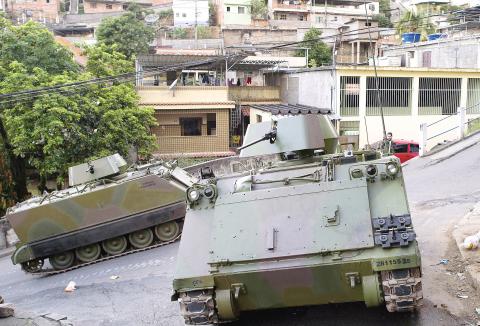Police have occupied a group of adjacent favelas in Rio de Janeiro, the latest slum “pacification” aimed at driving out drug traffickers and improving security in the coastal city.
Colonel Luis Castro Menezes, commander of the military police in Rio, says not a single shot was fired during the 50-minute operation on Sunday involving 590 police officers and 180 military troops in the Lins de Vasconcelos slums in the city’s north.
The slums include 12 communities with about 15,000 inhabitants.

Photo: AFP
Authorities plan to install two permanent police stations in the slums as part of the city’s “pacification” program.
Television images showed the zone’s commercial section opening on Sunday without incident and inhabitants going about their regular business.
Backed by Brazilian marines in armored vehicles, more than 1,000 police poured into a dozen slum neighborhoods in northern Rio just after dawn, meeting no resistance, Agence France-Presse journalists on the scene said.
“It’s one more step in the direction of peace,” Rio de Janeiro Governor Sergio Cabral said.
After sweeping through the area, police began going house to house to conduct searches and question suspects.
“That population has been clamoring for this for a long time,” Rio security chief Jose Mariano Beltrame said.
The deployment of so-called Police Pacification Units aims to wrest control of poor hillside neighborhoods from drug gangs and bring down violent crime in the city that will play host to the World Cup next year and Olympic Games in 2016.
The police tactics have come under scrutiny after 10 members of one pacification unit were arrested last week in the torture-slaying of a bricklayer who disappeared in July from Rocinha, the city’s largest favela with 70,000 inhabitants.
Amarildo de Souza’s disappearance set off protests by outraged residents demanding authorities explain what happened to him.
His body has not been found, but investigators say he was tortured to death by members of a pacification unit who were seen on a surveillance tape taking him into custody.
Police inspector Ellen Souto, who is heading the police investigation into the death, said 22 other people have charged they also were tortured with electric shocks and hot wax.
Cabral, under attack over the police scandal, defended the pacification units, who is known by their Portuguese acronym as the UPP.
“I lament the conduct of those police officers, which was abominable, but without a doubt it will not be a mark against the UPP,” he said.
He said investigations of crimes like De Souza’s disappearance was only possible when communities were pacified.
“How many crimes went unpunished before the police’s arrival in the hillsides,” he said.
With the two new stations, Rio now has 36 Police Pacification Units in its slums.

Kehinde Sanni spends his days smoothing out dents and repainting scratched bumpers in a modest autobody shop in Lagos. He has never left Nigeria, yet he speaks glowingly of Burkina Faso military leader Ibrahim Traore. “Nigeria needs someone like Ibrahim Traore of Burkina Faso. He is doing well for his country,” Sanni said. His admiration is shaped by a steady stream of viral videos, memes and social media posts — many misleading or outright false — portraying Traore as a fearless reformer who defied Western powers and reclaimed his country’s dignity. The Burkinabe strongman swept into power following a coup in September 2022

TRUMP EFFECT: The win capped one of the most dramatic turnarounds in Canadian political history after the Conservatives had led the Liberals by more than 20 points Canadian Prime Minister Mark Carney yesterday pledged to win US President Donald Trump’s trade war after winning Canada’s election and leading his Liberal Party to another term in power. Following a campaign dominated by Trump’s tariffs and annexation threats, Carney promised to chart “a new path forward” in a world “fundamentally changed” by a US that is newly hostile to free trade. “We are over the shock of the American betrayal, but we should never forget the lessons,” said Carney, who led the central banks of Canada and the UK before entering politics earlier this year. “We will win this trade war and

‘FRAGMENTING’: British politics have for a long time been dominated by the Labor Party and the Tories, but polls suggest that Reform now poses a significant challenge Hard-right upstarts Reform UK snatched a parliamentary seat from British Prime Minister Keir Starmer’s Labor Party yesterday in local elections that dealt a blow to the UK’s two establishment parties. Reform, led by anti-immigrant firebrand Nigel Farage, won the by-election in Runcorn and Helsby in northwest England by just six votes, as it picked up gains in other localities, including one mayoralty. The group’s strong showing continues momentum it built up at last year’s general election and appears to confirm a trend that the UK is entering an era of multi-party politics. “For the movement, for the party it’s a very, very big

SUPPORT: The Australian prime minister promised to back Kyiv against Russia’s invasion, saying: ‘That’s my government’s position. It was yesterday. It still is’ Left-leaning Australian Prime Minister Anthony Albanese yesterday basked in his landslide election win, promising a “disciplined, orderly” government to confront cost-of-living pain and tariff turmoil. People clapped as the 62-year-old and his fiancee, Jodie Haydon, who visited his old inner Sydney haunt, Cafe Italia, surrounded by a crowd of jostling photographers and journalists. Albanese’s Labor Party is on course to win at least 83 seats in the 150-member parliament, partial results showed. Opposition leader Peter Dutton’s conservative Liberal-National coalition had just 38 seats, and other parties 12. Another 17 seats were still in doubt. “We will be a disciplined, orderly